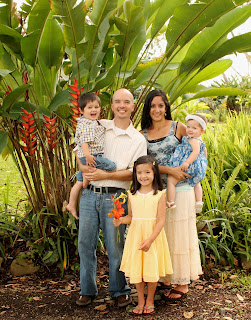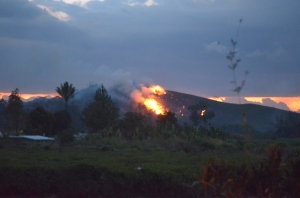"It started out as a feeling, which then grew into a hope.
Which then turned into a quiet thought which then turned into a quiet word.
And then that word grew louder and louder, until it was a battle cry."
In 1890, a Swiss physician named Courvoisier noted that patients who had a painless yellowing of their skin and eyes along with fullness in their abdomen most likely suffered from a cancer in their pancreas. His name accompanies this particular constellation of findings to this day, and it represents an ominous sign for a patient, and usually precipitates heart-sinking in their doctor.
In January of 2003, this particular finding was burned into my memory. I remember vividly the night that my mother and father sat all of us down in their living room and explained that it looked like my father had pancreatic cancer. He underwent a procedure to relieve some of his discomfort, but faced radical surgery. Even then, before starting medical school officially, I knew enough to be very scared. Few survive pancreatic cancer, even with the best care. I prayed furiously leading to the day of his surgery, and when the surgeon sent word that the surgery didn't go exactly as planned, I cried.

I looked at my father on his hospital bed as he recovered from his operation. I cried with my sister, Christy, at his side. I remembered the things I learned from him - a strong work ethic, respect for others, appreciating a job well-done, compassion for the sick and service to the poor and needy. I remember him saying, while we each tugged on various fencing around our property,
trying to rip their concrete bases from the ground, "You should learn to
respect working with your back and sweat, because many people you meet
won't have the chance to make a living with their brains like you do." Then he would climb onto our 1953 Ford tractor and we would work until after sundown on the remaining posts. Lessons that shaped who I was then and who I remain today. I remember his great passion for teaching medicine - and feared that I would never get to learn that art from him.
Miraculously, every biopsy report from his surgery came back all clear. Samples sent to the military research hospital confirmed - no evidence of cancer. Some months later, he went back to medicine and teaching and we never bothered about his cancer again.
Fast forward 13 years. It's Monday morning at Kudjip, and a man in his late 50's enters my room. His abdomen is mildly swollen, his eyes are bright yellow and his skin has a sallow appearance, even for someone with dark complexion.
I put my hand on the right side of his abdomen, and that heart-sinking begins. Joseph had pancreatic cancer, and no options in the remote mountains of Papua New Guinea. I sat down and explained his illness to him in no uncertain terms. He took in every word, asked a few questions. The space between us felt thick with discouragement.

Earlier this month, my father arrived at Kudjip hospital to visit us, along with my mother. They hadn't seen their grandchildren in over a year and spent five glorious days enjoying them. My dad came to work alongside myself and Dr. Bill McCoy - his first ever student in medicine and my medical mentor. Dr. Bill attended my birth nearly 33 years ago as a physician-in-training under my dad. Last year he delivered my child, using the skills my father taught him decades ago. He has mentored me as I take these steps into serving as a physician amongst the people of Papua New Guinea. And for an incredible week the three of us attended patients together and discussed dreams of healing the world's ills.

Then the opportunity I secretly prayed for arrived. As I took call for the hospital, a nurse called from our Obstetrics ward. "Doctor, we have a fetal distress" I arrived in the ward to find a mother struggling with labor pains and a baby who, by listening to its heartbeat, seemed stressed from the process. I quickly gave her IV fluids and placed a catheter to drain her bladder.
"Let's go to the OR"
I telephoned my dad who had probably just fallen asleep at our neighbor's house on station.
"Dad, we have a C-section, are you up for it?"
"Of course, I'll be right there"
Before I could even get the car down our road, he met me near the hospital, having walked up in the black of night.
We went to the OR and scrubbed as the nurses prepared mom and our anesthetist administered a spinal block.
I wondered, after more than forty years of doctoring but almost a decade without delivering babies, if my dad would be up for a C-section. But it seemed second nature to him and within a few minutes we had a crying baby out on the nursery table. Stunned at first, he quickly picked up.
The whole time my father stayed here, I couldn't shake the concept of legacy - passing on the baton of medicine as a ministry to the sick, poor and vulnerable. Carried down through three medical and two biological generations.
Back in my office, I prayed for Joseph and prescribed some medicine for his pain and
nausea. As he prepared to leave, he stopped himself at my door, put his
hand on my arm and said, "Doctor, if God decides to take me home, that
is OK. But I am glad that I met you, and that you explained everything
to me so that I don't have to be worried." He turned out the door as
tears welled in his eyes, and promised to come see me again in a few
weeks.
I have no idea if Joseph will receive the same kind of miraculous
healing that my father did. I've long since given up trying to piece
together the ins-and-outs of God's sovereignty in the face of this
suffering. But I know that my time and prayers helped him, and the
memory of his hand on mine expressing his thanks keeps my heart tender
to those around me. And that, too, I believe is a part of the great
legacy I inherit and hope to pass on.
So what kind of character, values and faith do I want to give to my children? Younger doctors I might one day teach or mentor? My patients?
The same kind I received, I think.




































